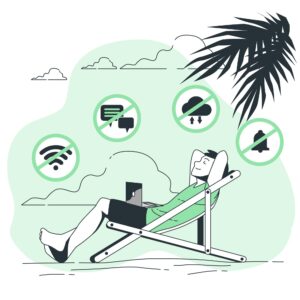In today’s fast-paced, hyper-connected world, it’s hard to imagine a day without our devices. From smartphones to laptops, tablets to smartwatches, digital technology has become intertwined with nearly every aspect of our lives. While these devices offer convenience, entertainment, and productivity, they also come with a hidden cost: our mental health.
Digital overload—characterized by excessive screen time, constant notifications, and the pressure to stay connected—has been linked to various negative mental health outcomes, including anxiety, depression, and poor sleep. Yet, an emerging solution to this modern dilemma is surprisingly simple: digital detoxing.
In this article, we’ll explore how unplugging from technology can have a profound, often surprising impact on your mental health. By taking a break from screens, you can reduce stress, increase mindfulness, foster deeper social connections, and improve your overall well-being.
What is Digital Detoxing?

Digital detoxing refers to intentionally disconnecting from digital devices and online platforms to reduce screen time and give the brain a break from the constant influx of information. It could be as simple as taking a few hours off from your phone or as drastic as a week-long retreat to a place without internet access. The goal is not to avoid technology entirely but to find balance and create space for more meaningful experiences.
While digital detoxing may seem like a trend, its benefits are grounded in scientific research. Studies have shown that overexposure to technology—especially social media and constant notifications—can trigger feelings of anxiety, lower attention span, and cause emotional exhaustion. In contrast, stepping away from devices can reset your mental state, offering a chance for reflection, relaxation, and reconnection with the present moment.
Reduces Stress and Anxiety
One of the most significant mental health benefits of digital detoxing is the reduction of stress and anxiety. In our always-on culture, our phones are constantly buzzing with updates, emails, messages, and notifications. This relentless stream of information, coupled with the pressure to stay on top of everything, can lead to a sense of overwhelm.
Taking a break from digital distractions allows you to lower your stress levels. Research shows that checking your phone frequently can increase cortisol—the stress hormone—leading to feelings of unease and anxiety. When you disconnect, your mind can relax, and you can engage in activities that promote relaxation, like reading a book, going for a walk, or practicing deep breathing.
By stepping away from the digital world, you allow your nervous system to reset. This pause can be an effective way to reduce the emotional and mental tension that accumulates from constant connectivity.
Improves Sleep Quality

In our digital age, poor sleep has become a widespread issue, and excessive screen time before bed is one of the leading culprits. The blue light emitted from smartphones, tablets, and computers interferes with the production of melatonin, the hormone that regulates sleep. Incorporating regular exercise into your daily routine can also improve sleep quality, helping counteract the negative effects of screen time and promoting better rest.
Digital detoxing, especially in the evening, can help improve your sleep. When you limit your exposure to screens in the hours leading up to bedtime, your body can naturally wind down, and you’re more likely to experience restful, uninterrupted sleep. The absence of digital distractions also allows for more time to engage in calming pre-sleep rituals like reading, journaling, or meditating.
Studies have found that people who reduce their screen time report feeling more refreshed and energized after a full night’s rest, improving both their physical and mental health.
Enhances Mindfulness and Presence
One of the surprising benefits of a digital detox is its ability to enhance mindfulness. When we’re constantly glued to our screens, we often miss the beauty and significance of the present moment. Our minds are frequently split between the virtual world and the physical world, making it difficult to fully engage in our surroundings and relationships.
By disconnecting from digital distractions, you can cultivate a greater sense of mindfulness. Digital detoxing encourages you to be more present, whether you’re savoring a meal, taking a walk, or having a conversation. Without the constant pull of notifications or the urge to check your phone, your mind can focus on the task at hand.
This enhanced sense of presence can have a profound impact on your well-being. Mindfulness has been shown to reduce symptoms of anxiety and depression, improve emotional regulation, and increase overall happiness.
Strengthens Relationships

Digital detoxing doesn’t just benefit your individual mental health—it can also improve your relationships with others. In an age where we often communicate through texts, emails, and social media, face-to-face interactions have become less common. Yet, authentic connection and deep communication thrive when we engage with others in person, without the interference of technology.
By disconnecting from your devices, you can prioritize real-world interactions with loved ones. Spending quality time with family and friends without the distraction of screens fosters more meaningful conversations and deeper connections. It allows you to truly listen and be present with those around you, which can improve the quality of your relationships and reduce feelings of loneliness.
Digital detoxing also provides an opportunity to engage in shared activities that don’t involve technology—whether it’s playing a board game, hiking in nature, or cooking a meal together. These experiences promote bonding and help build stronger, more supportive relationships.
Fosters Creativity and Focus
Many people don’t realize just how much digital distractions can hinder their creative potential. When we’re constantly switching between tasks and checking our devices, our brains struggle to maintain focus and concentration. The constant pull of social media, emails, and notifications can lead to mental fatigue, making it harder to engage in creative thinking or deep work.
Taking a digital detox allows your mind to reset and recharge. With fewer distractions, you can engage in activities that nurture creativity, like writing, drawing, or brainstorming. The mental clarity that comes from disconnecting can help you think more deeply, solve problems more effectively, and tap into your creative potential.
Additionally, reducing digital distractions can lead to improved focus. Without the temptation to check your phone every few minutes, you can devote more time and energy to important tasks, increasing your productivity and sense of accomplishment.
Encourages Physical Activity

When we spend too much time online, we often neglect our physical well-being. Long hours spent sitting in front of a screen can lead to a sedentary lifestyle, contributing to issues like poor posture, weight gain, and reduced energy levels. Digital detoxing encourages more movement by creating time for physical activities.
Without the constant pull of digital devices, you may find yourself going for a walk, joining a fitness class, or engaging in outdoor hobbies. Physical activity not only improves your physical health but also has a positive impact on mental well-being. Exercise has been shown to reduce symptoms of depression and anxiety, boost mood, and enhance cognitive functioning.
Conclusion
In a world where technology is ever-present, digital detoxing is an essential practice for preserving mental health. By taking time to unplug from devices, you can reduce stress and anxiety, improve sleep, increase mindfulness, and foster deeper relationships. Whether it’s through a weekend retreat or simply setting aside an hour each day to go screen-free, the benefits of digital detoxing are clear.
Incorporating regular digital detoxes into your routine can help you reclaim control over your mental health and well-being. By giving yourself permission to disconnect, you create space for creativity, relaxation, and authentic connection. So, go ahead—unplug, recharge, and rediscover the surprising benefits of living in the moment.


